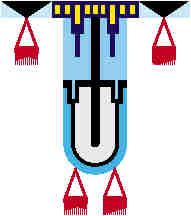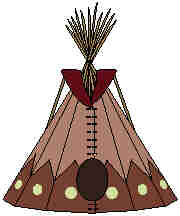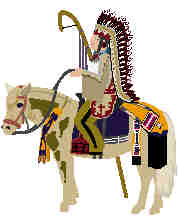
The Indian Child Welfare Act of 1978 is a Federal law that protects the rights of Indian children, families and tribes. Prior to the Act, many State courts and weifare departments were removing an inordinately high percentage of Indian children from their homes and tribes, and placing them in non-Indian homes and institutions. As a result of these practices many Indian children were losing their cultural identity, while the tribes were losing their greatest resource--the next generation of tribal members.
The best interests of Indian children in most cases can be served by strengthening and preserving Indian families. Therefore, the Act provides for the establishment of Indian child and family service programs whose goals are to prevent the breakup of Indian families. They also insure that the permanent removal of an Indian child from parental custody is done as a last resort.
If it is deemed necessary to temporarily remove a child from his family, the minimum Federal standards of evidence (established by the Act) must first be met. Testimony of an expert witness justified as being knowledgeable in Indian customs and social relations must also be given. The decision to place a child in foster care must be based solely on the family's ability to provide a suitable home by the standards of their Indian community. These provisions protect Indian families from the overly harsh judgements of culturally-biased court systems. Courts can, however, temporarily bypass these provisions in emergency situations when the child is in immediate physical danger and make a temporary placement of the child in a foster home or institution. Upon the emergency removal of the child, the agency must expeditiously initiate a child custody proceeding under the provisions of the Act and transfer the child to the jurisdiction of the tribe, unless the State can show good cause to the contrary. The child would then be restored to the custody of the parent or Indian custodian when he/she is no longer in danger.

Indian parents have the legal right to temporarily transfer the physical care, custody, and control of their child to other Indian adults. This individual--the Indian custodian--can also be given legal custody of an Indian child under tribal law or custom or State law.
A designated Indian custodian has the same right to due process as Indian parents have under the regulations of the Indian Child Welfare Act.

In all involuntary removal proceedings involving an Indian child (or a child which the court has reason to believe is Indian), the State Court must notify the child's parents or Indian custodian, and their tribe of their right to intervene in the case. If the child's tribal affiliation is not known, the court must notify the regional office of the Bureau of Indian Affairs. The Bureau, upon receipt of State Court notification, in turn has 15 days to notify the child's parents or Indian custodian, and his tribe. The tribe has, upon receipt of written notification, 10 days to respond, although an additional 20 days may be granted if it is requested.
When the tribe chooses to intervene in a case, the State Court must give "full faith and credit" to the public acts, records and judicial proceedings of the tribal court. In some instances, the tribe may choose to have a "transfer of jurisdiction", in which case the legal proceedings are transfered to the tribal court, unless the State can show good cause why it should not be transfered.
In all proceedings, the child's parent or Indian custodian must be notified of their right to an attorney, and be appointed one (free of charge) if they cannot afford one.
All of the Act's provisions are in effect even if only one of the child's biological parents is Indian.
 WHAT IS THE PROCEDURE FOR OUT-OF-HOME PLACEMENT OF AN INDIAN CHILD?
WHAT IS THE PROCEDURE FOR OUT-OF-HOME PLACEMENT OF AN INDIAN CHILD?
In all foster care, preadoptive, and adoptive placements preference is given, unless there is good cause to the contrary, to placing the child with:
This order of preference is in effect unless the tribe establishes a different order of preference by resolution. This may occur in cases where a consenting parent is seeking anonymity.
Parental consent must be given in writing and recorded before a judge of competent jurisdiction, who then certifies that all regulations concerning voluntary consent have been met. These regulations include the following provisions: 1) the consequences of the consent were explained in full detail to the parent or Indian custodian and that they fully understood the explanation in English or it was fully translated into their native language; and 2) the consent was not given prior to the child's birth, or within the first ten days of the Indian child's life.
 HOW DOES THE I.C.W.A PROTECT THE RIGHTS OF INDIAN PARENTS AND CHILDREN IN ADOPTION PROCEEDINGS?
HOW DOES THE I.C.W.A PROTECT THE RIGHTS OF INDIAN PARENTS AND CHILDREN IN ADOPTION PROCEEDINGS?
In any voluntary proceeding for termination of parental rights or adoptive placement of an Indian child, the parents may withdraw with consent and have the child returned to them at any time before court has ordered their rights to be ended, or before the adoption decree is finalized.
After the child has been adopted the parent(s) can still withdraw consent if the adoption has been in effect for less than two years and the parent(s) can prove that their consent was originally obtained through fraud, the use of force or threats.
In any involuntary proceeding for termination of parental rights the court must prove beyond a reasonable doubt that the child will be physically or emotionally damaged by staying with the parents, before parental rights can be ended.
When an adopted Indian child reaches eighteen years of age, the court which entered the final adoption decree must inform the child of his tribal affiliation, the identity of his biological parents, and any other information that is necessary to protect the child's rights obtained frrom his tribal relationship.

This Act protects the Indian child who is:
This Act does not apply in juvenile cases resulting from a child's delinquent actions or in child custody cases of divorce proceedings.

Copies of the Act can be obtained from your State Senator. Copies of each State-Tribal Indian Child Welfare Act Agreement can be obtained from the State Commission on Indian Affairs of the State involved.
Other informational resources include your local regional office of the Bureau of Indian Affairs, your local regional office of the Bureau of Indian Affairs, your local Tribal Organization or Indian Center.
Or write to:
Indian Adoption Awareness Project
Council of Three Rivers American Indian Center
120 Charles Street
Pittsburgh, PA 15238
| Council of Three Rivers American Indian Center, Inc.(COTRAIC) | Return to Our Home Page | Rainbow Adoption Program | Family Tree Foster Care Program |
